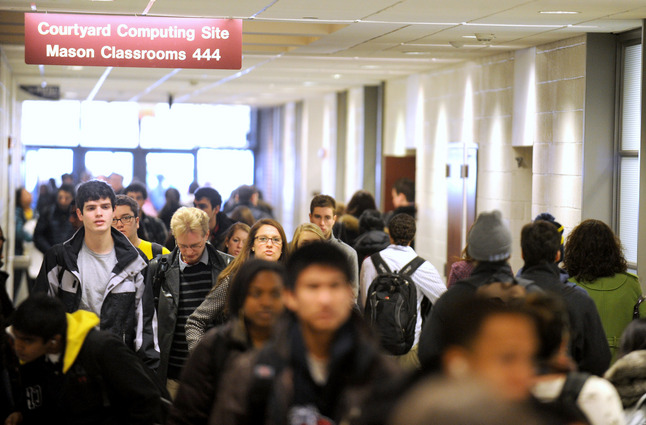Amidst decade of challenges, University of Michigan remains supportive of affirmative action

University of Michigan students between classes at Angell Hall.
AnnArbor.com file photo
The practice, officials say, promotes diversity on campus, and thus trickles down into the workforce, creating an increasingly diverse proletariat. It also enriches the education experience by providing a wider array of perspectives, they say.
Last month at a National Press Club forum in Washington, D.C., U-M President Mary Sue Coleman said she is a "huge believer in affirmative action" and called it a "complete falsehood that it's a depriving qualified people of an education."
When Proposal 2, a state ballot initiative passed in 2006, banned any consideration of race in admissions by Michigan's 15 public universities, Coleman vowed to fight for affirmative action. And leading up to the Supreme Court oral arguments concerning the University of Texas' admissions policy, which considers an applicant's race, Coleman's staff filed a friend-of-the-court brief supporting affirmative action polices.
On Thursday the school's National Center for Institutional Diversity held a symposium championing diversity in higher education and featuring speakers in support of affirmative action."Without deliberate attention to race we cannot go forward," said Nancy Cantor, the event's keynote speaker, an outspoken affirmative action advocate and the chancellor of Syracuse University.

Nancy Cantor
AP Photo
In the past decade there have been many occasions for U-M to defend affirmative action polices.
Prior to Proposal 2, U-M lawyers defended the affirmative action practices used by its admissions officials before the highest court in America.
The U.S. Supreme Court ruled in 2003 that race could be a factor in admissions, but could not be weighed too heavily and could not be attached to quotas. That decision set a national precent that still stands today, but that may be superseded by the Fisher v. Texas decision.
Yet Proposal 2 passed three years later, banning the consideration of race in admissions and thwarting the effect of the high court ruling for Michigan's public schools. A lawsuit over the legality of that initiative has been brewing in the federal court system for years in and is now U.S. 6th Circuit Court of Appeals.
The amicus brief filed by U-M for the Fisher v. Texas case implores the court to continue using the standard set by the 2003 case, Grutter v. Bollinger.
During the Thursday event, Cantor said weighing race in admissions is crucial in overcoming a "divisive, zero-sum world that pits us" apart.
Forum attendee Rashid Echols, who is black, graduated from U-M in May 2012 and is now working at his alma mater. He said opponents of affirmative action and statutes like Proposal 2 "delay the whole moving forward process."
"It's a good thing," he said of affirmative action. "It gives the [black] community a shot."
By promoting diversity the practice also enriches the learning environment, he said. "As a black person, I have so much to learn from [other races] and [they] have so much to learn from me. We have different cultures and different experiences."
Yet despite U-M's clear support for affirmative action policies, there remains a strong nucleus of Americans who oppose the practice. Like Abigail Fisher, the plaintiff in the Texas case, many opponents say the practice itself constitutes discrimination, giving an unfair advantage to applicants of color and promoting admissions practices where race risks overriding merit.
In 2011, 33 percent of U-M freshmen said they supported affirmative action policies. That same year, 42 percent of college freshmen throughout the nation supported weighted admissions policies, according to an annual freshman survey conducted jointly by the University of California's Cooperative Institutional Research Program and U-M.
in 2011, underrepresented minorities constituted 10.5 percent of U-M's freshman class, down slightly from the previous year. In 2011, approximately 5 percent of U-M’s student body was Hispanic, 6 percent black and slightly more than 1 percent was Native American.
During oral arguments in Washington, D.C., last week, Supreme Court Justice Sonia Sotomayor said "the bottom line" of the Texas case is to determine "at what point [the federal government] stop[s] deferring to the university's judgement that race is still necessary."
Though that question will remain unanswered until the Supreme Court issues a ruling on the Texas case sometime next year, it is clear that U-M — and many other colleges — still consider affirmative action policies central in creating a diverse campus.
In fact Coleman recently told the Michigan Daily that she could not foresee a time when affirmative action policies were not necessary.


Comments
Roger Kuhlman
Mon, Oct 22, 2012 : 3:40 a.m.
Affirmative action is euphemism for discrimination and favoritism for certain groups of people backed by powerful political elites. The Civil Rights movement of the 60's came into being in part stop discrimination like this. People should be judged on the content of their character and their personal achievements only.
rulieg
Fri, Oct 19, 2012 : 6:37 p.m.
Coleman said she cannot foresee a time when affirmative action policies won't be necessary? that's a very interesting statement, because of course what they TELL us is that this is just a temporary stopgap measure to bring minority-student numbers in line with majority-white student numbers. former justice O'Connor even said that she thought "25 years from now" we wouldn't need it anymore. as Chief Justice Roberts put it, the only way to stop discriminating on the basis of race is to stop discriminating on the basis of race. note to U-M: that means you!
AMOC
Thu, Nov 15, 2012 : 8:46 p.m.
Sorry about the down-vote rulieg. Fat fingers on my phone. I actually think you are right on. The way to stop discriminating on the basis of race is to stop discriminating on the basis of race. An objective and transparent admissions process is what UM needs to implement, not these endless appeals and coded race-baiting.
LXIX
Fri, Oct 19, 2012 : 12:27 p.m.
40 acres and a mule. Statistically, race should not be the deciding factor in intelligence merit and acceptance to the UM nor in the enhance economic well-being enjoyed thereafter. The facts of persistent inequality in the USA tell a different story. Until there is statistical proof showing that fair opportunity exists at all levels of life then compensation is still owed. When the public inclding the publicly owned UM, surounding cities, counties, and states deed their acreage over to the ancestors of slaves along with a few million free Harleys or Teslas then we can start to dismantle affirmative action. Where's my Tesla?
JuAn
Fri, Oct 19, 2012 : 5:58 a.m.
"All men are created equal" Are we? Our kids go to the same public schools, have the same education opportunities, study the same curriculum.... Why they are treated differently in university admission based on race? Is this fair??? Or, we weren't created equal? Do you admit?
LXIX
Fri, Oct 19, 2012 : 1:29 p.m.
Nobody knows for sure how we came to be but we all have slightly different DNA mutations. Possibly originated by aliens for galatic entertainment who in turn were created by an unknown. Equality is the optimal competitive state strived for by intelligent beings as that is where the most for all concerned exists. Some who take advantage over the balance eventually learn that their good fortune is only temporary and then have to pay more for restoration until the golden balance is once more restored. Unfortunately, balance accounting wasn't introduced to humanity until recently. Maybe your great ancestors are owed compensation for being unfairly evicted from Africa.
Skyjockey43
Fri, Oct 19, 2012 : 12:08 a.m.
I have a dream that my children will one day live in a nation where they will not be judged by the color of their skin, but by the content of their character
Skyjockey43
Fri, Oct 19, 2012 : 3:40 p.m.
In case anyone missed it, that was a quote by Dr. Martin Luther King
JuAn
Fri, Oct 19, 2012 : 5:59 a.m.
same dream....
The Black Stallion3
Thu, Oct 18, 2012 : 10:50 p.m.
Typical liberal mentality.
Jay Thomas
Thu, Oct 18, 2012 : 10:46 p.m.
"The practice, officials say, promotes diversity on campus, and thus trickles down into the workforce, creating an increasingly diverse proletariat." Do they really use that term... proletariat? This explains why things have gone wrong in America; young people are being indoctrinated into Marxism and not educated.
Angry Moderate
Fri, Oct 19, 2012 : 5:39 a.m.
steven--most U of M grads work at Starbucks, especially those who study subjects that use the term "proletariat."
steven
Thu, Oct 18, 2012 : 11:32 p.m.
Ironically, they aren't using the term correctly, either. College graduates are professionals, not members of the working class (proletariat).
Billy
Thu, Oct 18, 2012 : 7:54 p.m.
It's not racist to use race in admissions.....right? ........
Macabre Sunset
Thu, Oct 18, 2012 : 7:51 p.m.
In practice, racism is rarely abated simply with kind reminders that it's against the law and morally wrong. Michigan can't reform until its culture is dramatically changed from within. These revolutions take time.
CRichmond
Thu, Oct 18, 2012 : 7:16 p.m.
My ethical problem with Affirmative Action isn't that it results over time ins a equitable balance. That should be OK. The problem is that the way we go about getting to balance is about the same as payback in slow motion. We took advantage of you, so you get to take advantage of us. I can't figure out a more harmful way to to do the job than that. Well, yes I can: 40 years of slavery and 40 denial of education, opportunity and rights could do it,and be be worse, overall. (4o years has an appropriately Biblical ring to it.) But the resentment would be even worse; a racial war. There's a bunch of folks who think we should start one. I don't. My trouble is, I can't see a LESS harmful way than slow motion payback. Well, I guess I can; support EVERY family at the same (high) level and make SURE they all get the best education they can. Lots of luck, eh? I dreamed I saw a great city finally at peace. Every building was thrown down,every street choked with rubble, and in a few windows still open to the outside, not one soul remained to look upon the peace we had made. Better get to work. excerpt: //if I could love her,/ Should I not as well,/ Love people only love/ Could keep from Hell?/ It seems to me of late/ That leaves no room at all/ For hate.// (author: myself; 2009)
Top Cat
Thu, Oct 18, 2012 : 6:44 p.m.
The U.S. Supreme Court seems poised to throw Reverse Discrimination in the trash heap where it belongs.
Wolf's Bane
Thu, Oct 18, 2012 : 5:59 p.m.
It is against law given that Proposal 2 passed three years ago, banning the consideration of race in admissions.
Jay Thomas
Thu, Oct 18, 2012 : 10:52 p.m.
Our public servants (Mary Sue et al) believe that they can pick and choose which of our laws they will have to apply. In that they are no different than our current President.:P